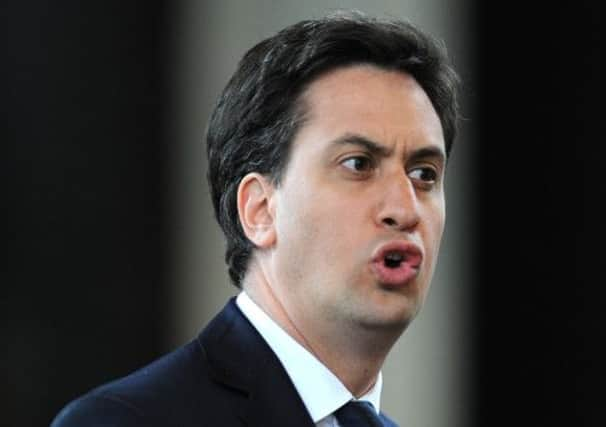Gregor Gall: Left rebirth takes more than United front


By law, a ballot must be held every ten years to decide upon whether a union can maintain its fund. Political funds allow unions to lawfully spend money on campaigning on political matters to support their unions’ policies. This can be for or against government policy or those of any other political party.
Of the 50-odd main unions, 16 are affiliated to the Labour party. As with all of them (including Unite), substantial portions of these funds are spent supporting Labour.
Advertisement
Hide AdAdvertisement
Hide AdSince Ed Miliband was elected Labour leader in September 2010, Unite has donated £8.5 million to the party, making it by far the biggest donor. The other two big unions, Unison and the GMB, together gave less than this sum.
But what is causing political tremors is that Unite, more than any other affiliated union, is implementing a strategy to get value for the money it gives Labour. Tony Blair and Peter Mandelson have been among the most vocal of those warning Miliband to resist Unite’s pressure. Blair argued that Labour risked turning into a “repository of people’s anger” rather than a viable party of government if it succumbed.
Unite wants to see Labour policies reflect its own policies. Just as importantly, it believes that unless Miliband and Labour move to the Left, they will neither offer a convincing alternative to the Tories nor will they make a sufficiently positive difference to the majority of citizens’ lives when in office.
Previously, affiliated unions would seek to influence Labour by getting their motions passed at party conferences. Of late, these are less policy-deciding forums and more media-friendly events. Affiliated unions would also seek to influence Labour’s general elections manifestos. Unions also sponsor MPs and have parliamentary groups.
But what Unite is doing beyond this is to get its members selected as prospective Labour parliamentary candidates for the 2015 general election. The more candidates it has, the more members will be elected. The means of getting its candidates selected is to get its members to join Labour and vote for them in the selection meetings.
So by late April this year, more than half the candidates already selected were from unions. Of those most came from Unite, leading one Labour insider to comment “Unite [is] marching all over the selection process”. The backlash against Unite’s strategy is the dynamic behind the recent suspension of the selection process in the Falkirk West constituency.
But even if Unite is successful, the issue of whether this most sustained, well-resourced and strategic “reclaim Labour” project will deliver a more left-wing Labour Party and a left-wing Labour government is open to doubt. For example, Miliband has maintained commitment to the outline of the coalition government’s spending cuts and its pay freezes for public sector workers.
This doubt arises because of four factors. First, there is the opposition to what Unite is doing from the Blairites inside and outside the shadow cabinet. This cannot so easily be swept aside when it buttresses Miliband’s position. So although the Blairites have criticised Miliband for what he has done of his own volition, Miliband and the Blairites are making common cause in standing against Unite.
Advertisement
Hide AdAdvertisement
Hide AdSecond, Miliband has only formally repudiated “new” Labour. His advocacy in January 2012 of “responsible capitalism” is troubling because it is still very much “new” Labour precisely because he is unwilling to use state intervention to curb the excesses of private capital. Rather, he wishes to implore companies to be nicer and wiser. Then he turned to Disraeli’s “one-nation” Toryism last October.
Neither idea has had any flesh put on its bones – the on-going party policy review is hardly a reason for Miliband not to do so. This gives Miliband maximum political flexibility in responding to the coalition government. But that flexibility is grounded within the parameters of accepting neo-liberalism and the age of austerity.
The absence of progressive, coherent “big picture” ideas means Unite faces a huge struggle because the door to progressive Labour policies is hardly even ajar.
Third, Unite has not been able to make its own common cause with Unison and the GMB unions in order to exert a greater pull towards its ideas. Although the three unions worked closely together over influencing Labour’s manifestos in the past decade, Unite is now far to the Left of the other two unions and works more closely with the non-Labour affiliated union, the PCS.
Fourth, Unite has in itself been inconsistent. It was the key union that secured Miliband’s victory over his brother, David, in the Labour leadership contest. Within 18 months, it attacked him for the vacuity of his “responsible capitalism”, then lauded his “one-nation” speech as “the best speech from a Labour leader”. A couple of months ago, Unite launched a broadside by saying Miliband was in danger of being seduced by the Blairites.
Unite was hitting the wrong target here because it was saying the “king is fine, but his advisers aren’t”. While the Blairites are not unimportant, Miliband has followed his own path by his own volition so that he is Unite’s problem.
The political fund’s renewal and its primary expenditure on Labour present Unite with a dilemma. There are no credible alternatives to the Left of Labour but that does not make the task of reclaiming Labour any easier.
• Gregor Gall is professor of industrial relations at the University of Bradford